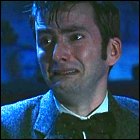 Martha manages to turn the tables on the Family as they try to force John Smith to change back into the Doctor. Smith, Joan, Martha and the other villagers run for the safety of the school, where the call to arms is sounded ahead of an attack by the Family and their army of scarecrows. Tim, the schoolboy with the pocketwatch containing the Doctor’s Time Lord essence, helps to distract the Family, and later, after Smith goes into hiding, brings the watch to him. With the English countryside under siege, even Joan is now convinced that Smith isn’t what he seems, and that he can help to save the day…but now that he’s found love and happiness in human form, will the Doctor’s alter-ego choose to become a Time Lord again?
Martha manages to turn the tables on the Family as they try to force John Smith to change back into the Doctor. Smith, Joan, Martha and the other villagers run for the safety of the school, where the call to arms is sounded ahead of an attack by the Family and their army of scarecrows. Tim, the schoolboy with the pocketwatch containing the Doctor’s Time Lord essence, helps to distract the Family, and later, after Smith goes into hiding, brings the watch to him. With the English countryside under siege, even Joan is now convinced that Smith isn’t what he seems, and that he can help to save the day…but now that he’s found love and happiness in human form, will the Doctor’s alter-ego choose to become a Time Lord again?
written by Paul Cornell
directed by Charles Palmer
music by Murray GoldGuest Cast: Jessica Hynes (Joan Redfern), Rebekah Staton (Jenny), Thomas Sangster (Tim Latimer), Harry Lloyd (Baines), Tom Palmer (Hutchinson), Gerard Horan (Clark), Lauren Wilson (Lucy Cartwright), Pip Torrens (Rocastle), Matthew White (Phillips), Sophie Turner (Vicar)
LogBook entry & review by Earl Green
Review: “Everything that John Smith is and was…I’m capable of that too.” I’ve tried very hard to look at Human Nature differently in TV form than I look at it in book form, but with that line of dialogue right there, the entire point of the original story is jettisoned. So I’m going to try very hard to avoid saying “it wasn’t like that in the book” from here on out.
I have to praise the young actor who played Tim, the kid who wound up with the Doctor’s essence – there could’ve been a whole side-story there with him and we didn’t spend nearly enough time with him. And I will give credit where it’s due – following Tim from his youth to the battlefields of World War I to Remembrance Day is powerful and effective, and the Remembrance Day scene in particular may be about the only instance where the televised story actually manages to exceed the book. Both of them contained that scene, but it demands a certain visual power that it gained here in spades.
Martha also wins the day here, as it is she who has to save everyone’s bacon, repeatedly – almost to the point that the clueless Smith shouldn’t even have to ask what the Doctor needs her for as a companion. By that point, she’s done enough that it should be plainly obvious. David Tennant does a great job of conveying Smith’s angst and his fear of losing everything, but somehow, it’s all so rushed, and so full of detours (such as the flashbacks to the tentative idyllic future that Smith risks giving up) that what should be a powerful performance barely has a chance to take root. Yet another intriguing concept, that Smith is a man of peace even without the Doctor’s influence, comes and goes in the blink of an eye.
 It’s odd, that in both paragraphs above, I mention the story needing to have more time to play out, and I suppose that was my biggest fear about “Human Nature” coming to the small screen: that it would all be so compressed that most of its central themes would be elbowed out of the way in favor of spectacle (i.e. a lengthy montage of dissolves between shots of the same guys in the same scarecrow costumes, trying to give the impression that there are dozens of them). Sadly, this really turned out to be the case.
It’s odd, that in both paragraphs above, I mention the story needing to have more time to play out, and I suppose that was my biggest fear about “Human Nature” coming to the small screen: that it would all be so compressed that most of its central themes would be elbowed out of the way in favor of spectacle (i.e. a lengthy montage of dissolves between shots of the same guys in the same scarecrow costumes, trying to give the impression that there are dozens of them). Sadly, this really turned out to be the case.
The new series of Doctor Who seems to have a track record of poaching the best of the “expanded universe” tales that were told during the wilderness years, whether they’re New Adventures novels or Big Finish audio plays, and then seeming to lose track of the very thing that made the originals so memorable. If I could influence the production and direction of the new series just one way, I would put an embargo on that practice in a cold second. I realize that only diehard fans are going to spot the retreads, but even when I try to take them on their own merits, the episodes spawned from other media seem to suffer.

